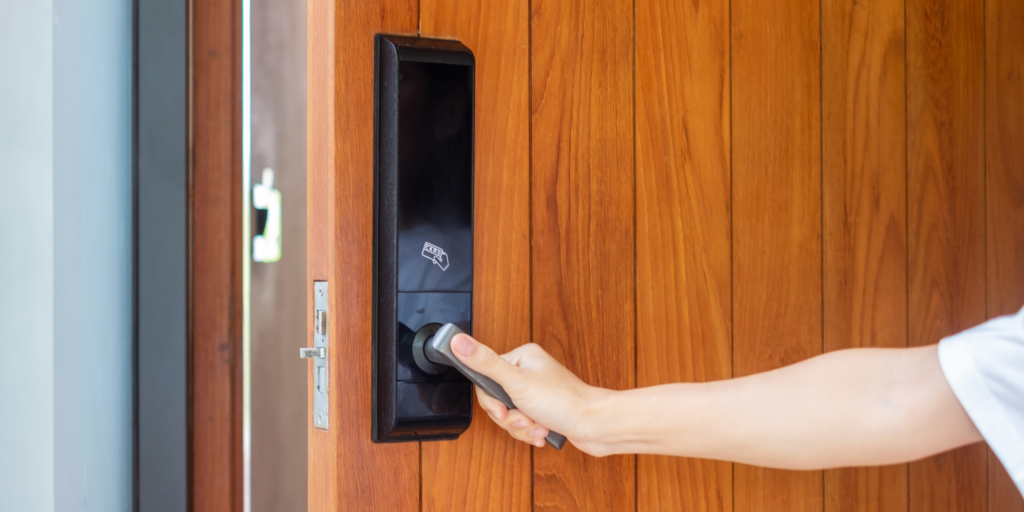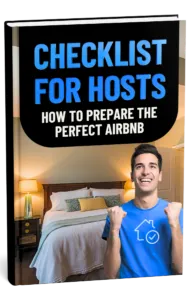Unlocking Success: Essential Airbnb Listing Requirements You Must Know

Are you ready to skyrocket your Airbnb success? Crafting the perfect listing is the key to attracting guests and maximizing your rental income. In an increasingly competitive market, ensuring your property stands out is more critical than ever. From captivating descriptions that highlight unique features to high-quality photos that showcase your space, each element plays a vital role in drawing potential renters.
But it’s not just about aesthetics; understanding essential requirements such as local regulations, guest expectations, and the nitty-gritty of pricing can make or break your hosting experience. Join us as we unveil the essential Airbnb listing requirements you must know to unlock your property’s full potential and turn your hosting dreams into a thriving reality. Whether you’re a seasoned host or just starting, this guide will equip you with the insights needed to elevate your listing for success. Let’s get started!
10 Inspiring Airbnb Listing Examples That Will Skyrocket Your Bookings
Understanding Airbnb’s Platform and Community Standards
To begin your journey toward Airbnb success, it’s essential to familiarize yourself with Airbnb’s platform and community standards. These guidelines are designed to ensure a safe and trustworthy environment for both hosts and guests. Ignoring these standards can lead to penalties, including listing suspensions or permanent bans. Therefore, understanding and adhering to these rules is non-negotiable.
At the heart of Airbnb’s community standards are principles such as safety, security, and respect. As a host, you are expected to provide a safe and secure environment for your guests, which includes adhering to local laws and Airbnb’s safety guidelines. This could range from having functional smoke detectors to ensuring the structural integrity of your property. Additionally, you must respect your guests’ privacy and space while maintaining open and honest communication. These principles not only protect the guests but also build your reputation as a reliable host.

Airbnb’s platform also emphasizes the importance of non-discrimination and inclusivity. This means you must welcome guests of all backgrounds and treat them with respect. Discriminatory practices or language can lead to immediate suspension of your account.
To foster a positive and inclusive community, Airbnb encourages hosts to set clear house rules that align with these values. This helps in managing expectations and ensures that guests feel respected and valued. By adhering to these community standards, you contribute to a positive hosting experience that benefits both you and the wider Airbnb community.
Another critical aspect of Airbnb’s platform is the review system. Reviews are a cornerstone of trust within the Airbnb community, and they play a significant role in your listing’s success. Encouraging guests to leave honest reviews can help you build credibility and attract more bookings.
Responding to reviews, whether positive or negative, shows that you value guest feedback and are committed to improving their experience. By understanding and embracing Airbnb’s platform and community standards, you lay a strong foundation for a successful hosting journey.
Importance of High-Quality Photos for Your Listing
The saying “a picture is worth a thousand words” holds exceptionally true when it comes to your Airbnb listing. High-quality photos are often the first impression potential guests will have of your property, and they can significantly influence their decision-making process. Investing in professional photography can make your listing stand out in a crowded market and attract more bookings. Clear, well-lit images that showcase the best aspects of your space can captivate potential guests and give them a realistic expectation of what to expect.
When taking photos, consider capturing a wide range of shots that highlight different areas of your property. This includes the living room, bedrooms, kitchen, bathrooms, and any unique features such as a backyard, pool, or stunning view.
Ensure that each room is clean, well-organized, and clutter-free before photographing. Natural light can enhance the appeal of your photos, so try to take pictures during the day when the light is best. If you lack photography skills, hiring a professional photographer can be a worthwhile investment. High-quality photos not only attract more views but can also justify higher pricing.
In addition to interior shots, exterior photos are equally important. Guests want to see the outside of the property, including the entrance, garden, and any outdoor amenities. These images can help guests visualize their stay and feel more confident in booking your space.
Don’t forget to include photos of any special features that set your property apart, such as a cozy fireplace, a beautiful balcony view, or a unique architectural design. By presenting your property in the best possible light, you increase the chances of attracting more guests and maximizing your rental income.
Crafting an Engaging and Informative Listing Description
An engaging and informative listing description is vital for attracting potential guests and setting clear expectations. Your description should be detailed, highlighting the unique features and amenities of your property while also providing practical information about the space.
Start with a compelling headline that grabs attention and gives a glimpse of what makes your property special. Follow this with a detailed description that covers everything from the layout of the space to the type of neighborhood it’s located in.
When writing your listing description, be honest and transparent. Misleading information can lead to negative reviews and disappointed guests. Describe the number of bedrooms and bathrooms, the type of beds available, and any additional sleeping arrangements like sofa beds or air mattresses. Mention amenities such as Wi-Fi, air conditioning, heating, and kitchen appliances. Highlight any unique features like a hot tub, fireplace, or home theater. The more information you provide, the easier it is for guests to decide if your property meets their needs.
In addition to describing the physical space, consider including information about the neighborhood and nearby attractions. Guests often choose accommodations based on location, so mentioning local restaurants, parks, public transportation, and tourist attractions can add value to your listing.
Use descriptive language to create a vivid picture of what guests can expect during their stay. However, avoid overloading your description with too much information. Keep it concise, informative, and engaging to capture the interest of potential guests.
Setting Competitive Pricing for Your Airbnb
Pricing your Airbnb property competitively is crucial for attracting bookings and maximizing your rental income. Setting the right price requires a balance between covering your costs and offering value to guests. Start by researching similar listings in your area to understand the going rates for properties with comparable features and amenities. This will give you a benchmark to base your pricing on. Consider factors such as location, property size, and the quality of amenities when determining your price.
Dynamic pricing is another effective strategy for optimizing your rental income. This involves adjusting your rates based on demand, seasonality, and local events. During peak seasons or special events, you can increase your rates to capitalize on higher demand. Conversely, during off-peak times, lowering your prices can help attract more bookings. Airbnb offers a smart pricing tool that automatically adjusts your rates based on market trends, which can be a valuable resource for new hosts.
Transparency in pricing is also important. Clearly list any additional fees, such as cleaning fees or extra guest charges, to avoid surprises for your guests. Offering discounts for longer stays or last-minute bookings can also attract more guests.
Regularly reviewing and adjusting your pricing strategy based on guest feedback and market changes can help you stay competitive and ensure a steady stream of bookings. By setting competitive and transparent pricing, you enhance your chances of attracting guests and achieving success as an Airbnb host.
Essential Amenities to Include in Your Listing
Providing essential amenities can significantly enhance the guest experience and increase the appeal of your listing. While the specific amenities you offer may vary based on your property and target audience, there are some basics that every guest expects.
These include clean bedding and towels, toiletries such as shampoo and soap, and a well-equipped kitchen with essentials like cookware, utensils, and appliances. Offering these basic amenities can make guests feel more comfortable and at home during their stay.
In addition to the basics, consider adding extra amenities that can set your listing apart and attract more bookings. High-speed internet, a smart TV with streaming services, and air conditioning are highly sought after by many guests. If your property is located in a colder climate, providing heating options like space heaters or a fireplace can be a big plus. For families traveling with children, offering amenities like a crib, high chair, and toys can make your property more appealing.
Think about the unique features of your property and how you can enhance the guest experience. If you have a backyard or outdoor space, consider adding patio furniture, a barbecue grill, or a fire pit. For properties near the beach, providing beach towels, chairs, and umbrellas can be a thoughtful touch. If your property is in a city, offering a guidebook with local recommendations can help guests make the most of their stay. By providing a range of essential and extra amenities, you can create a memorable and enjoyable experience for your guests, leading to positive reviews and repeat bookings.
The Role of Guest Reviews in Your Listing Success
Guest reviews play a critical role in the success of your Airbnb listing. Positive reviews can boost your credibility and attract more bookings, while negative reviews can deter potential guests. Encouraging guests to leave reviews is an important part of the hosting process. After a guest checks out, send a polite message thanking them for their stay and kindly requesting that they leave a review. This shows that you value their feedback and are committed to providing a great experience.
Responding to reviews, both positive and negative, is also important. Thank guests for positive reviews and mention that you look forward to hosting them again. For negative reviews, address the issues raised and explain how you plan to improve. This shows potential guests that you take feedback seriously and are dedicated to providing a better experience. Avoid getting defensive or confrontational in your responses, as this can reflect poorly on you as a host.
Consistently receiving positive reviews can help you achieve Superhost status, which comes with additional benefits such as increased visibility in search results and a badge on your profile that indicates you are a highly-rated and experienced host.
Superhosts are more likely to attract bookings and can often charge higher rates due to their reputation for providing excellent service. By focusing on delivering a great guest experience and actively managing your reviews, you can build a strong reputation and achieve greater success with your Airbnb listing.
Legal Requirements and Regulations for Airbnb Hosts
Navigating the legal requirements and regulations of hosting on Airbnb is essential for ensuring a smooth and compliant operation. Different cities and countries have varying rules regarding short-term rentals, so it’s important to research and understand the regulations that apply to your property. This may include obtaining necessary permits or licenses, paying local taxes, and adhering to zoning laws. Failure to comply with these regulations can result in fines or legal action, so it’s crucial to stay informed and up-to-date.
In many locations, short-term rental properties are subject to specific regulations that aim to balance the interests of hosts, guests, and the local community. These regulations may include occupancy limits, safety requirements, and restrictions on the number of nights a property can be rented out per year. Some cities also require hosts to register their property with the local government and display a registration number on their listing. Understanding and following these regulations helps ensure that you are operating within the law and can prevent potential issues down the line.
Insurance is another important consideration for Airbnb hosts. Regular homeowner’s insurance may not cover short-term rentals, so it’s important to check with your insurance provider and obtain the necessary coverage. Airbnb offers Host Protection Insurance, which provides liability coverage for hosts in case of guest injuries or property damage. However, this may not cover all scenarios, so having additional insurance can provide extra peace of mind. By understanding and adhering to legal requirements and obtaining proper insurance, you can protect yourself and your property while providing a safe and compliant hosting experience.
Tips for Optimizing Your Listing for Search Visibility
Optimizing your Airbnb listing for search visibility is key to attracting more potential guests and securing bookings. Airbnb’s search algorithm considers various factors when ranking listings, so understanding how to optimize your listing can give you a competitive edge. Start by ensuring that your listing title and description include relevant keywords that guests are likely to search for. For example, if your property is a beachfront condo, include terms like “beachfront,” “ocean view,” and “condo” in your title and description.
High-quality photos and a complete profile can also improve your search visibility. Listings with clear, professional photos and detailed descriptions tend to rank higher in search results. Fill out all sections of your profile, including your host bio, to provide guests with a complete picture of who you are and what they can expect.
Regularly updating your calendar and responding promptly to booking inquiries can also boost your ranking. Airbnb’s algorithm favors active and responsive hosts, so maintaining an up-to-date calendar and quick response rate can help your listing appear higher in search results.
Offering competitive pricing and implementing dynamic pricing strategies can further enhance your listing’s visibility. Airbnb’s smart pricing tool can help you adjust your rates based on market demand, making your listing more attractive to potential guests. Additionally, achieving and maintaining positive reviews can improve your search ranking. Encouraging guests to leave reviews and responding to feedback shows that you are a responsive and attentive host, which can boost your credibility and search visibility. By following these tips and regularly optimizing your listing, you can increase your chances of attracting more guests and achieving success on Airbnb.
Common Mistakes to Avoid When Creating Your Listing
Creating a successful Airbnb listing involves careful attention to detail and avoiding common mistakes that can negatively impact your bookings and guest experience. One common mistake is providing inaccurate or misleading information in your listing description. Overstating the size of your property or exaggerating amenities can lead to disappointed guests and negative reviews. Be honest and transparent about what your property offers to set clear expectations and build trust with potential guests.
Another mistake to avoid is neglecting the quality of your photos. Poor-quality images that are dark, blurry, or cluttered can deter potential guests from booking your property. Invest in high-quality photography that showcases your space in the best possible light. This includes taking photos of each room, highlighting unique features, and ensuring that the property is clean and tidy before photographing. High-quality photos can make a significant difference in attracting guests and securing bookings.
Failing to communicate effectively with guests is another common pitfall. Prompt and clear communication is crucial for providing a positive guest experience. Responding slowly to inquiries or not addressing guest concerns can lead to frustration and negative reviews. Make sure to check your messages regularly and respond promptly to any questions or issues that arise. Providing detailed check-in instructions and being available to assist guests during their stay can enhance their experience and lead to positive reviews. By avoiding these common mistakes and focusing on delivering a great guest experience, you can create a successful and attractive Airbnb listing.
Conclusion: Elevating Your Airbnb Success Through Compliance and Quality
In conclusion, unlocking success on Airbnb requires a combination of compliance with regulations, attention to detail, and a commitment to quality. Understanding Airbnb’s platform and community standards sets the foundation for a positive hosting experience. High-quality photos, engaging and informative descriptions, and competitive pricing are essential elements that attract guests and enhance your listing’s appeal. Providing essential amenities and delivering exceptional guest experiences lead to positive reviews and repeat bookings.
Navigating legal requirements and obtaining proper insurance ensures that you operate within the law and protect your property and guests. Optimizing your listing for search visibility and avoiding common mistakes can give you a competitive edge in a crowded market. By focusing on these key areas and continually improving your hosting practices, you can elevate your Airbnb success and achieve your hosting goals.
Whether you are a seasoned host or just starting, this guide provides the insights and strategies needed to create a thriving Airbnb listing. By prioritizing compliance, quality, and guest satisfaction, you can unlock your property’s full potential and turn your hosting dreams into a reality. Embrace these essential Airbnb listing requirements and take the first step toward a successful and rewarding hosting journey.

Sobre o Autor



